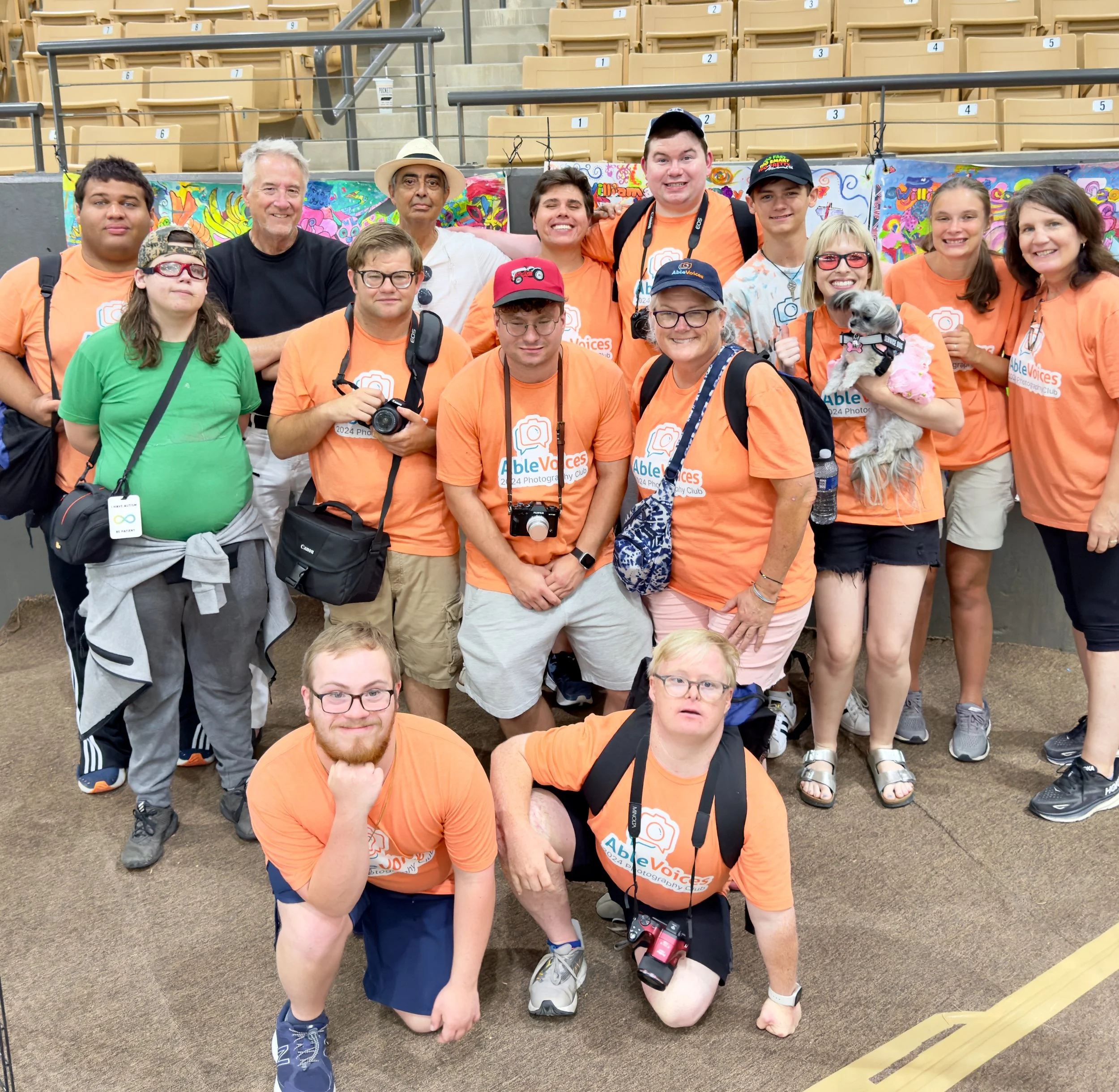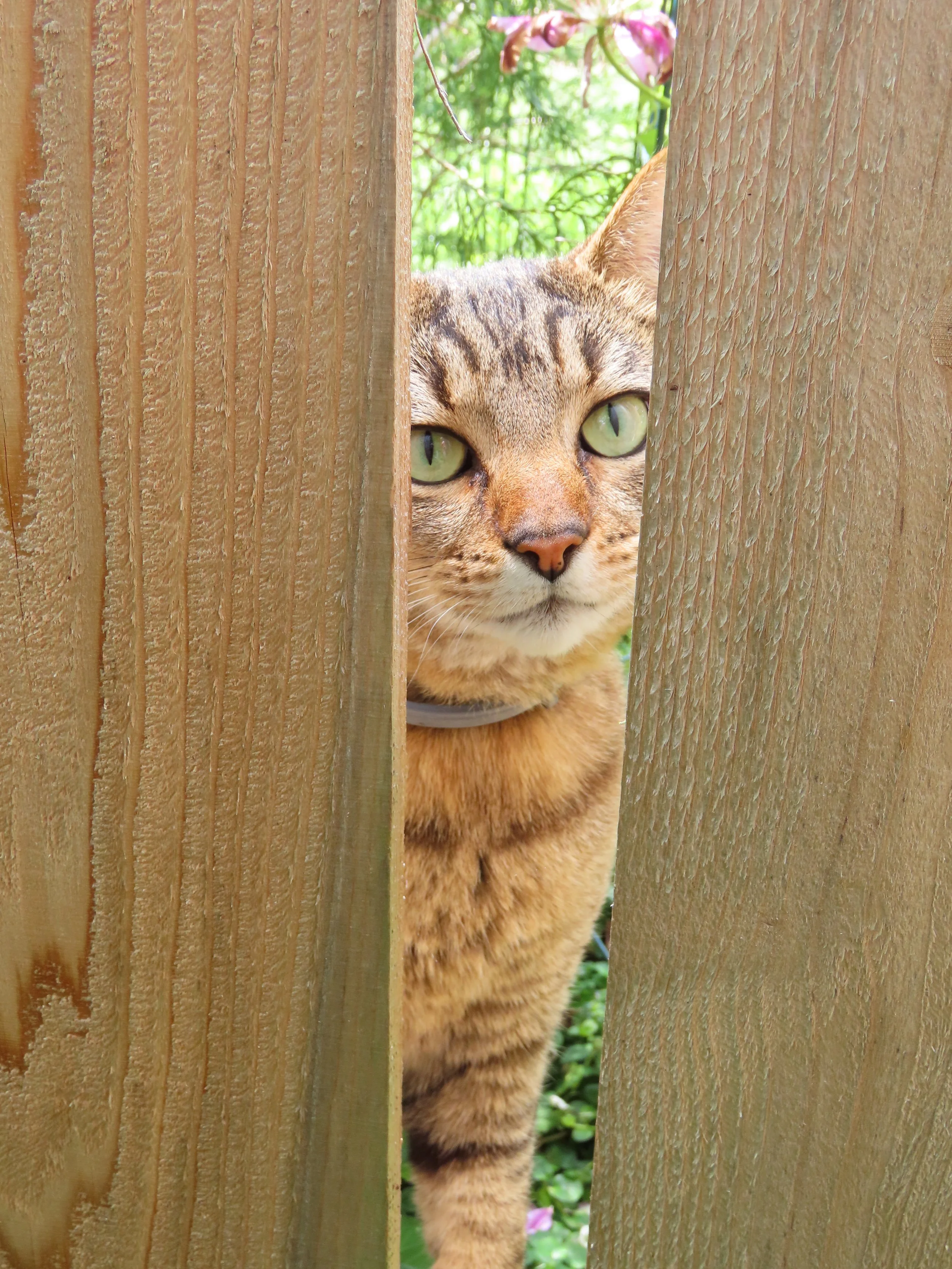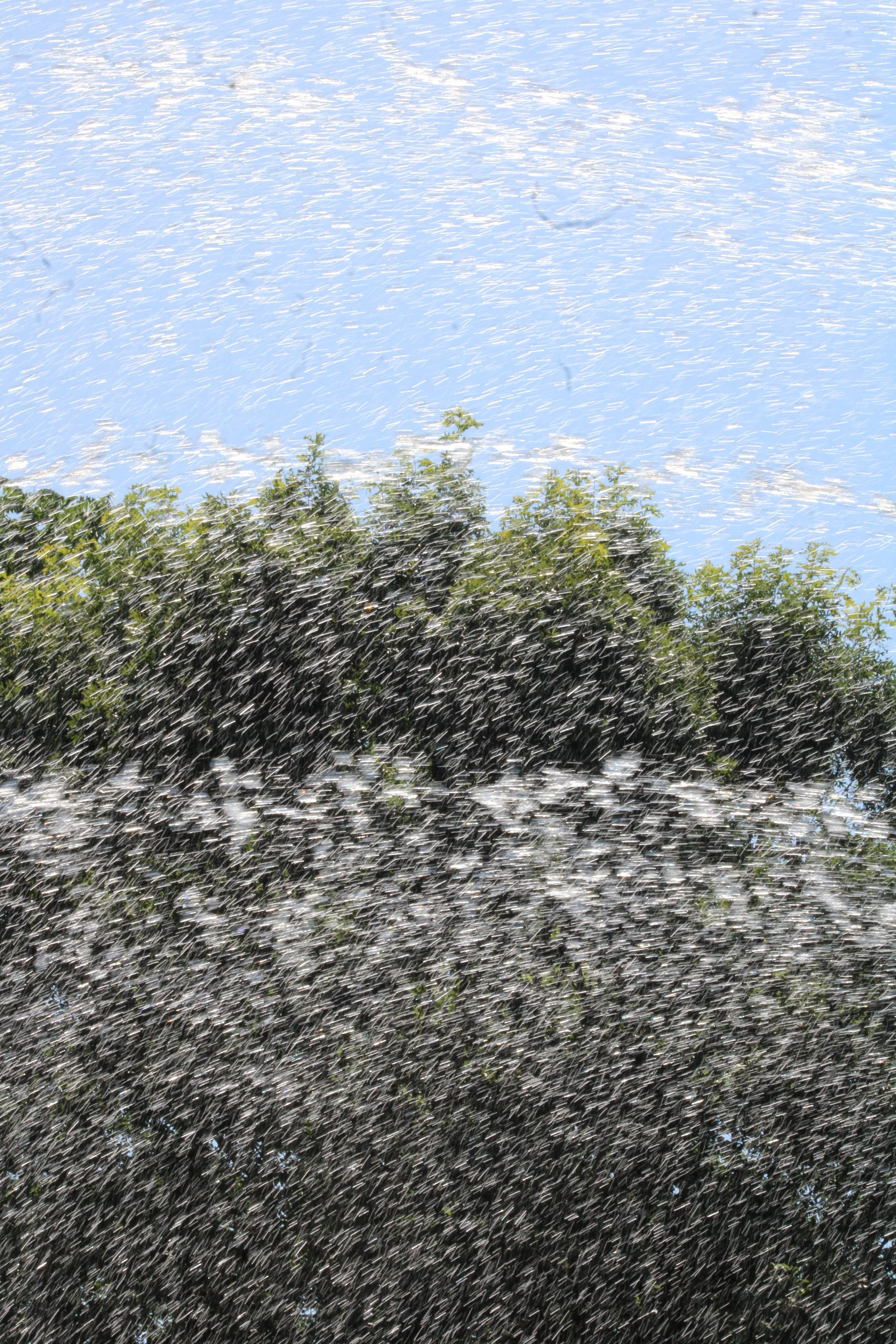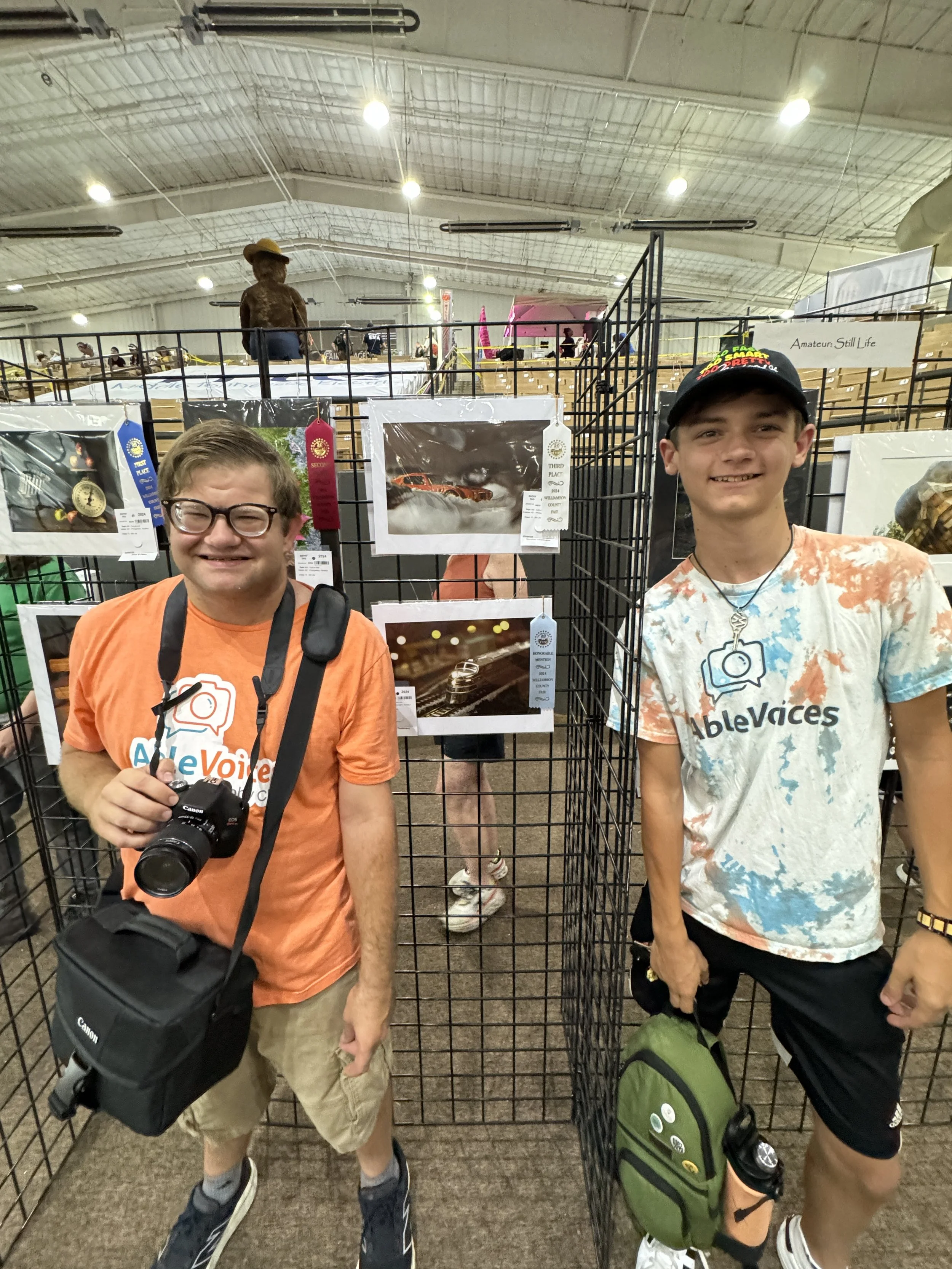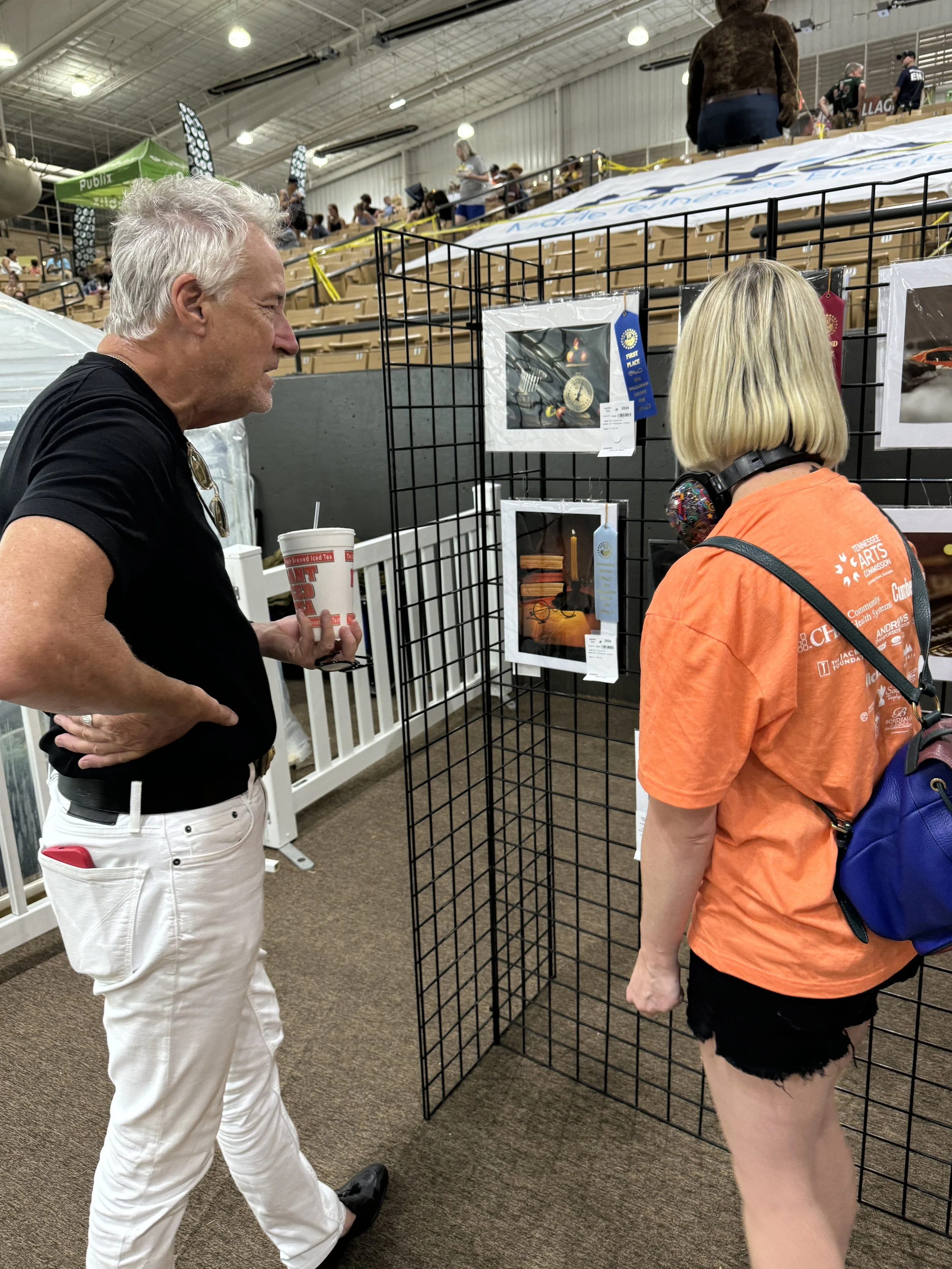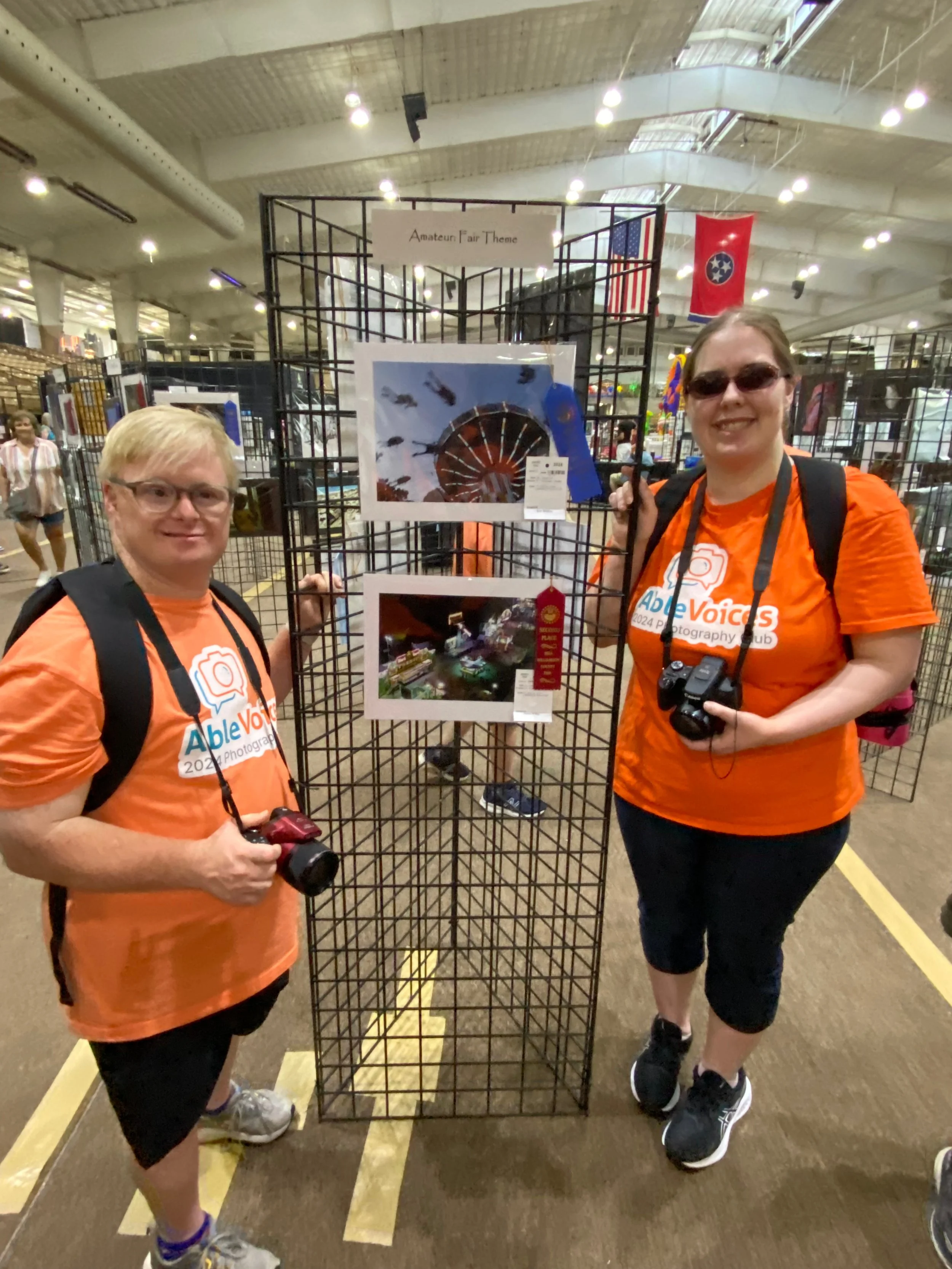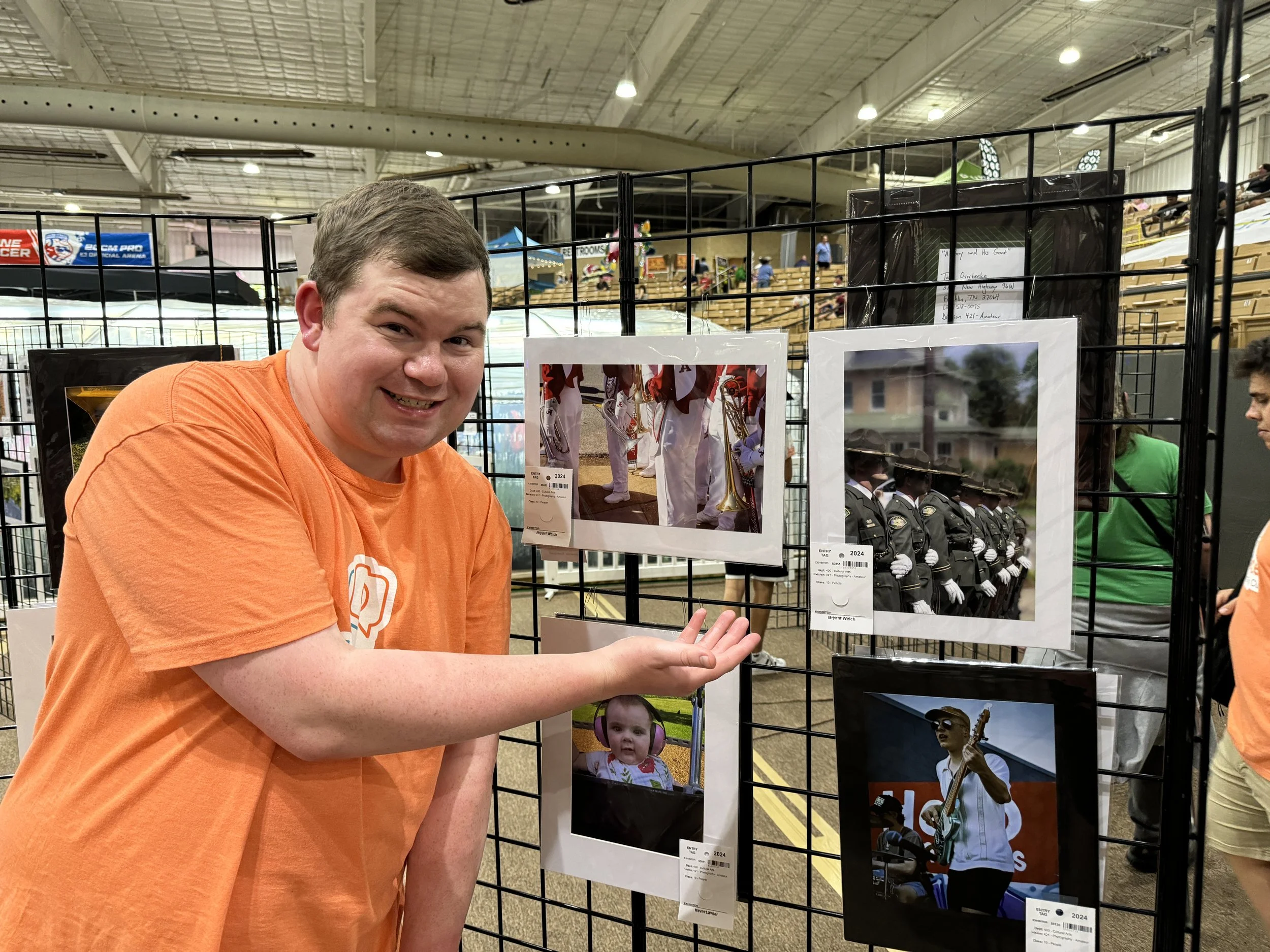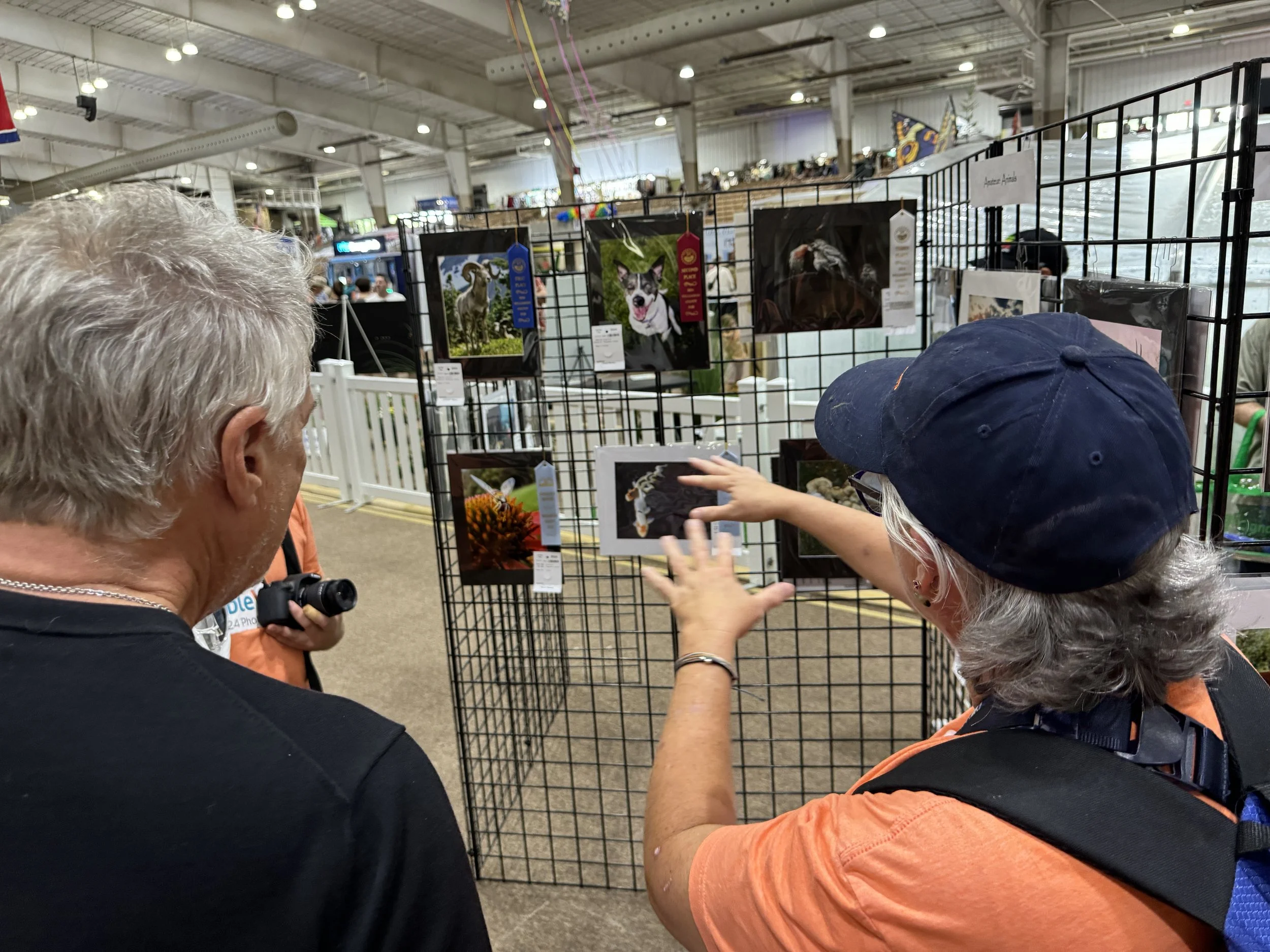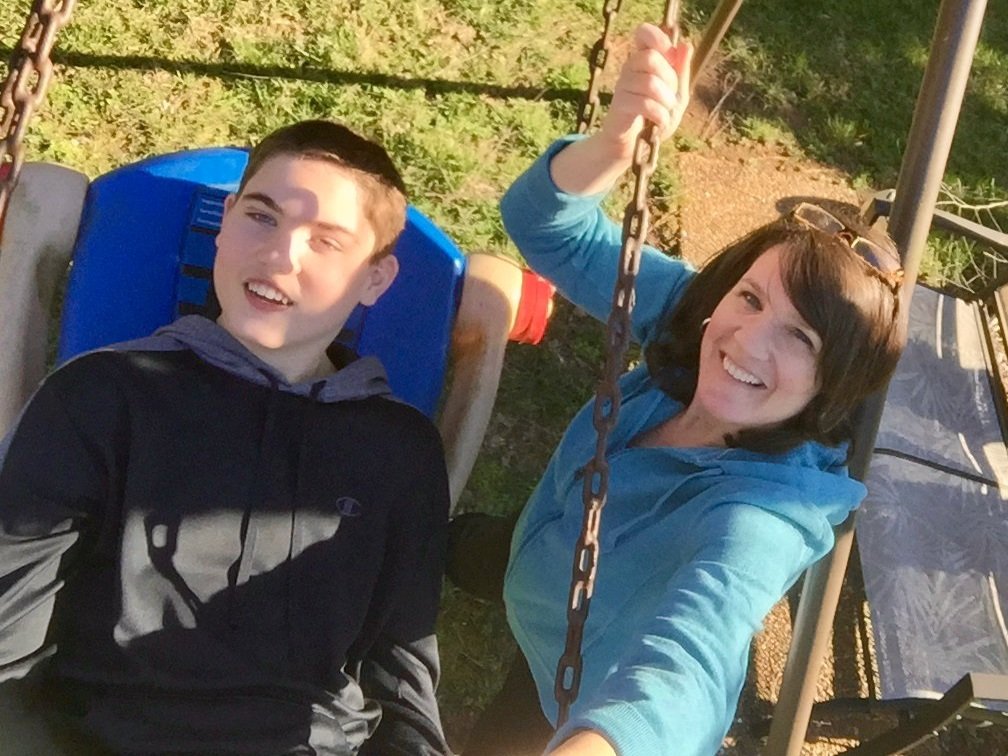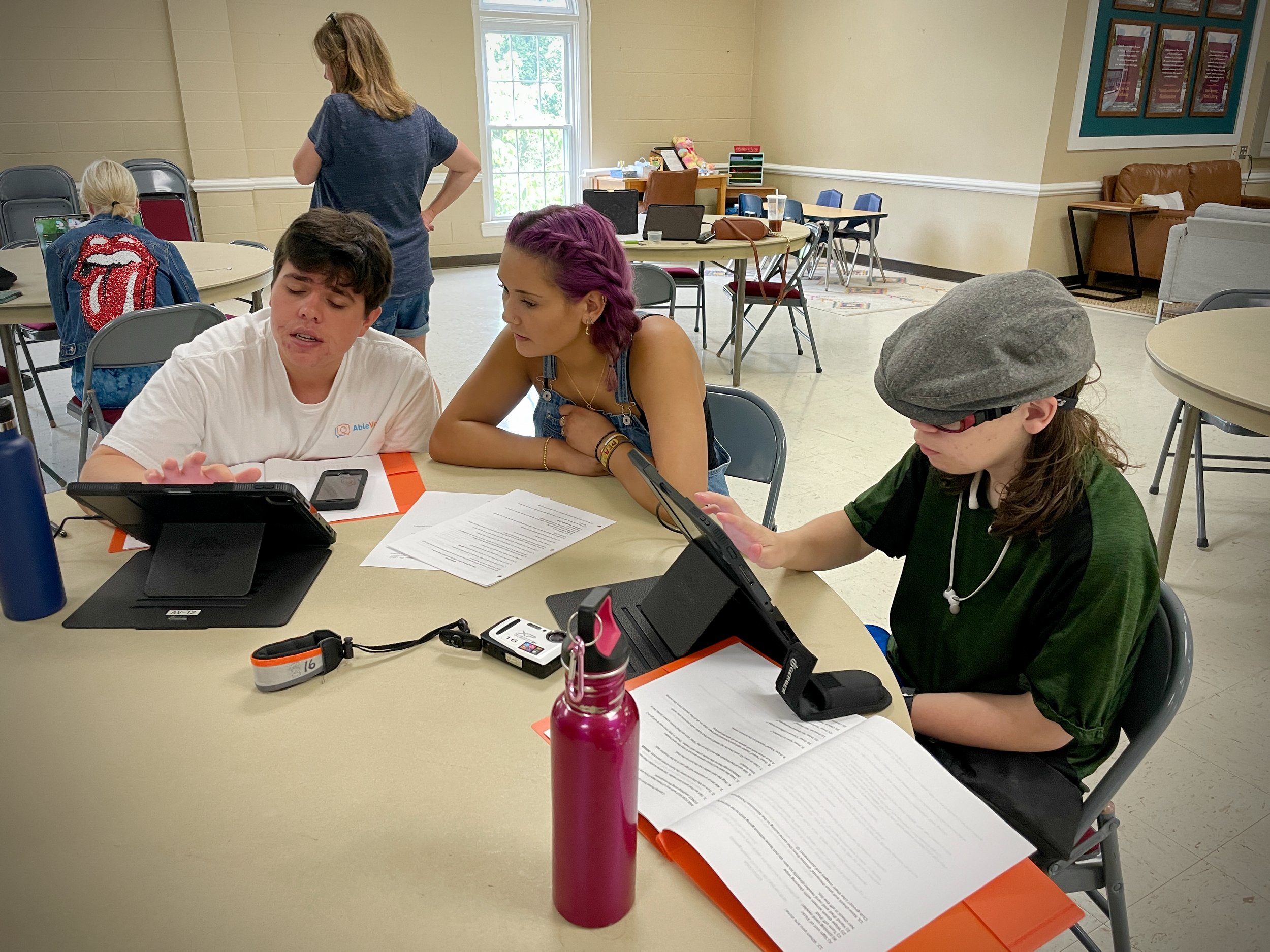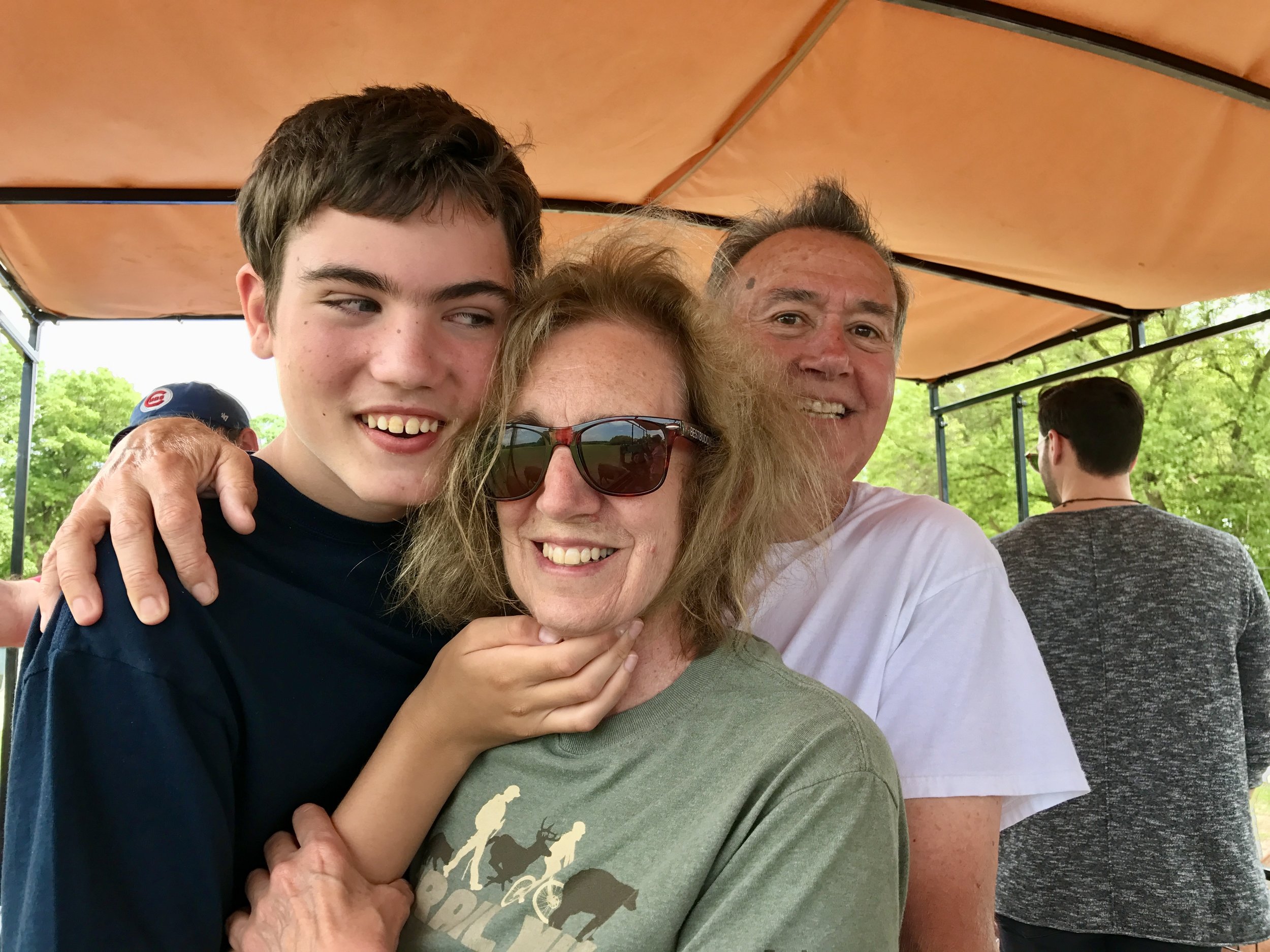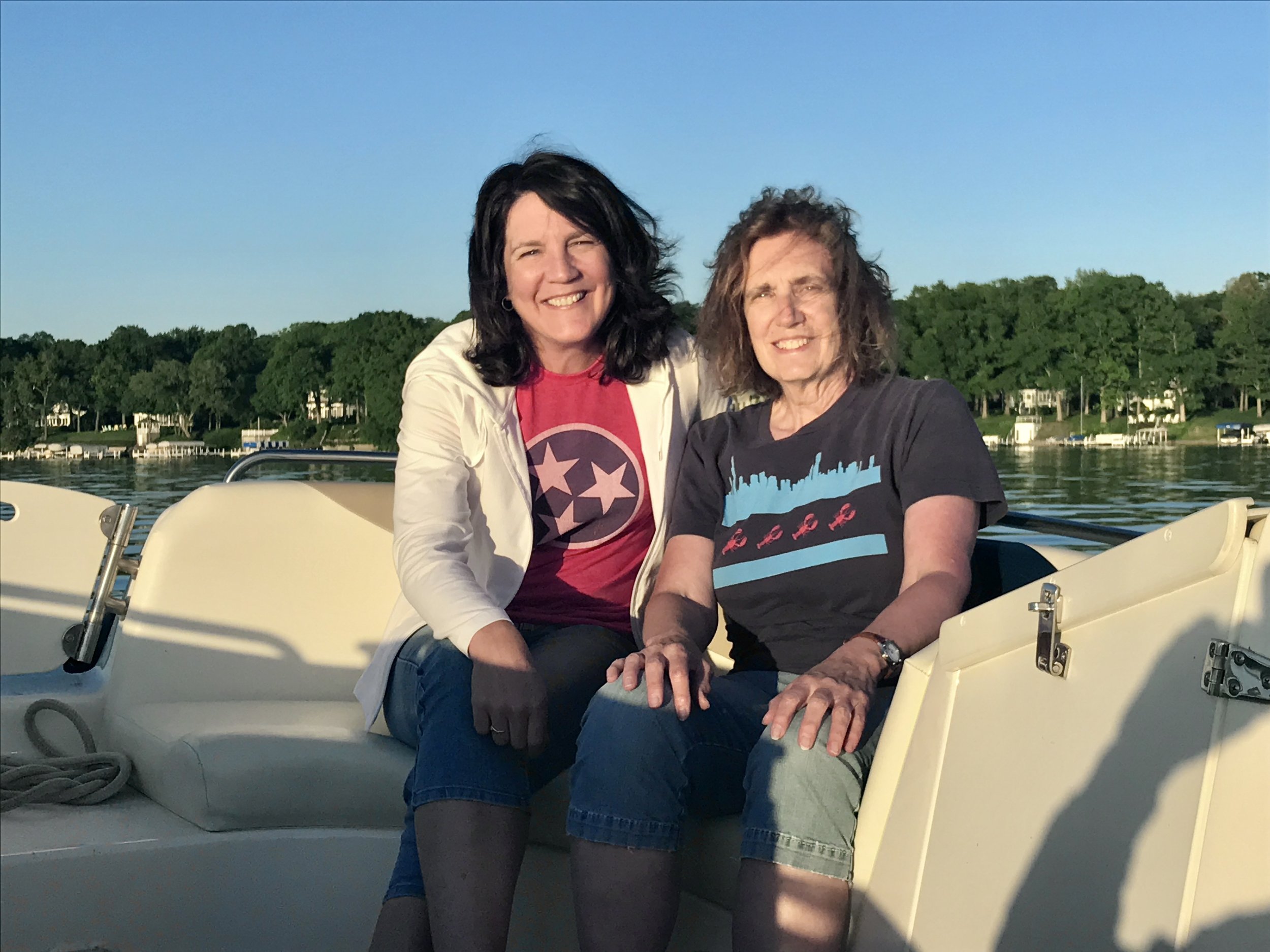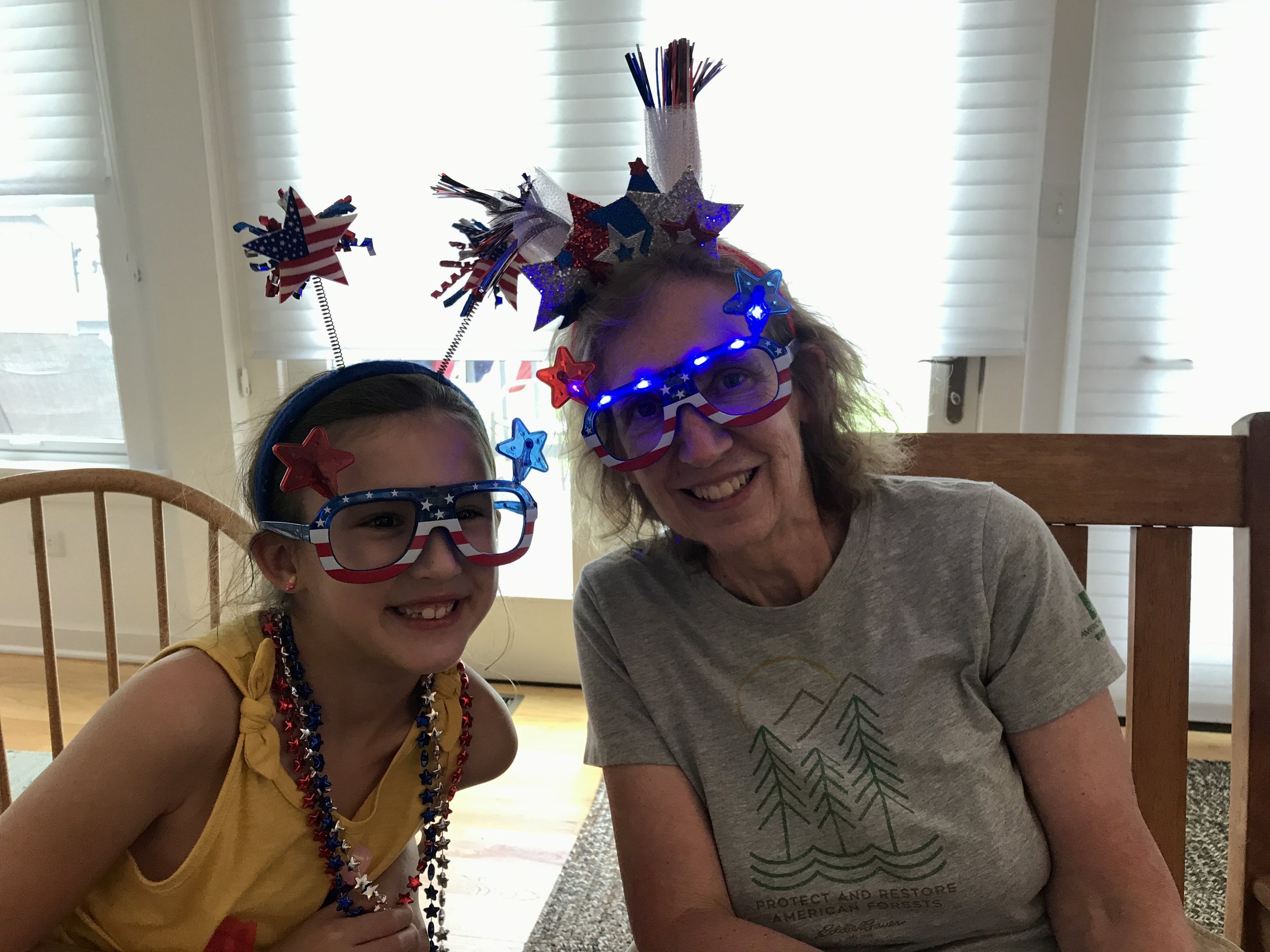Blog
An AbleVoices
Perspective
Follow along with periodic blog posts written by Jen Vogus,
AbleVoices Founder & Executive Director.
Celebrating Expression, Effort, and Community at the Williamson County Fair
AbleVoices 2024 Summer Photography Club visit to the Williamson County Fair Photography Exhibit. The 2025 WC Fair is on from August 1-9 at the WC Ag Expo in Franklin, TN.
Each summer at AbleVoices, I have the privilege of witnessing our photographers stretch themselves creatively, technically, and personally. This summer has been no exception. From weekly outings in the community, to PHun Friday sessions at our studio, our Summer Photography Club has been a time of learning, connecting, and creating together. Now, we’re excited to wrap up the season with one of our favorite annual traditions- a visit to the Williamson County Fair Photography Exhibit that includes the work of our very own photographers.
Every year, we encourage and support our photographers to submit their images to the fair. It’s a way to showcase the results of their hard work- and to take part in a long-standing community tradition that welcomes voices of all kinds. Participating in the fair isn’t just about seeing your photo on display. It’s also about contributing to something larger than yourself- and having your creativity and perspective valued alongside others in your community. Photography connects people. And being part of the fair photography exhibit reinforces what we strive for each week: to be out in the community, to feel welcomed, and to take pride in showing others who we are and how we see the world.
This year, (a record-setting) twenty-six AbleVoices photographers submitted their images to the fair exhibit- a juried show that welcomes entries from the wider community. For our photographers, it is a full process that spans the entire summer: capturing scenes or moments on location, selecting and editing images, and preparing them for public exhibition in our studio. That in itself is a worthy accomplishment- and one that takes time, effort, and perseverence. Whether or not a ribbon is awarded, what truly matters is the act of putting yourself and your art out into the world. And I am so grateful for our crew of volunteers who dedicate their time and energy to work with our photographers across all steps of this process.
We invite you to join us in celebrating our photographers’ hard work and creativity on Sunday, August 3, from 2:00–3:30 PM at the Williamson County Fair. Come stroll through the photography exhibit, meet some of our photographers, and hear directly from them about the images they chose to submit. Come say hello and enjoy an afternoon of creativity and community. We’d love to see you there! In the mean time, enjoy a selection of our photographers’ 2025 fair entries below.
NOTE: Sunday, August 3 is Senior Day at the Williamson County Fair and entry is free for those ages 55 and up. To purchase tickets, please visit https://www.williamsoncountyfair.org/p/get-tickets. The Photography Exhibit is located on the arena floor.
You Are Extraordinary
In February 2024, I was teaching photography to young adults with disabilities at a day program at a local church. The day was off to a great start- the students were engaged, the activity was fun, and the energy in the room was positive and encouraging. We were working on a photo scavenger hunt, practicing to “fill-the-frame” with our subject (the star of the photo). I often tell our photographers that getting close to the subject is one of the easiest ways to make photographs more interesting. The students used cameras provided by AbleVoices, but that day, I was using my phone to model this activity.
We captured dozens of images, checking off each item on our scavenger hunt list as we went along. I didn't give much thought to any particular photo in the moment. But a few days later, I noticed that my most recent photo- the one my phone displayed as my last taken- was an image from that day of a book titled, You Are Extraordinary. The cover illustration featured five children: one in a wheelchair, another holding a stuffed bunny, and another giving the peace sign. I shrugged it off as a glitch, assuming the issue would fix itself. But it didn’t.
Day after day, every time I opened my photo gallery, there it was: You Are Extraordinary.
At first, I smiled at the small quirk. Then, I started to reflect on what it meant. It felt like a persistent reminder- one I needed, and one that resonated deeply with the work I do at AbleVoices. Every day, I have the privilege of working with individuals with disabilities who have so many strengths and interests and work so hard- yet often, those qualities go unnoticed or are underestimated. The world does not always see them as extraordinary, but they are. People with disabilities are creative, insightful, and full of stories waiting to be told through their photographs.
This unexpected digital message also made me think about something more personal—my relationship with my Grandma Eiler, my dad’s mom. She grew up in a time when girls had many fewer opportunities than boys, and she used to get such a kick out of how outgoing and bold I was, especially when it came to sports and other activities she never had the chance to pursue. I can still hear her laughter as she’d shake her head and say, “Oh Jenny, are there any more out there like you? No, I think God broke the mold when he made you!”
At the time, I laughed along, never thinking much of it. But now, as I strive to live a life that makes a difference, I realize how much those words mean to me. We are all made from unique molds, each of us meant to fully embrace the qualities that make us who we truly are. Perhaps the photo of You Are Extraordinary didn’t disappear because I needed to be reminded of that truth—not just for myself, but for the people I work with every day.
As it turns out, that one photo somehow got dated February 8, 2025 despite the fact it was taken on that day in 2024. And no matter how many new photos I took, this one remained my "most recent." Just last month, it finally stopped appearing in that position. Maybe it wasn’t just a digital glitch, but rather a lingering message—one that stayed with me until I fully absorbed its meaning.
This past year has been a meaningful one for me, filled with opportunities to see and celebrate the extraordinary in others. AbleVoices exists to amplify voices that often go unheard, to showcase the beauty and power in every perspective. Photography is a way to capture not just images, but stories, emotions, and identities. It allows people to share how they see the world- and how they want the world to see them.
Glitch or not, You Are Extraordinary was exactly the message I needed, nudging me to continue this work with fresh eyes and a full heart. And maybe, if you’re reading this, it’s a message you needed as well.
Because you are extraordinary, too.
What is your experience with disability?
Jen Vogus shares about her experience with disability prior to her son being born.
Over the years, when talking to friends who also have kids with disabilities we’ve stumbled onto the topic of what our experiences were like with disability before having our child (or children) with a disability. And we’ve reflected on how raising this child has possibly reinforced our initial perceptions or if they have changed over time.
For me, the first time I specifically thought of my experiences with disability prior to my son (Aidan) being born, I wondered if there was some foreshadowing in my life that I was unaware of. There are three events that really stand out in my memory that shaped my perceptions of people with disabilities prior to Aidan being in my life.
In elementary school, I was part of a “fourth-fifth split.” That meant that each half of the class consisted of students from both grades. The thinking was placing the more academically successful 4th graders with 5th graders needing more support. Two of the students in fifth grade had intellectual and physical disabilities- Jeff and Allison. I sat next to these students, worked on group projects, played at recess and rode the bus with them. I knew they were different in some ways but I did not think much of it because they were my classmates and they belonged.
A few years later (mid-1980s) I remember walking by the family room at home and catching the start of a tv news show (something like 20/20). The segment was about “Mongoloid” children. And it made clear to me that this disorder, formally named Down Syndrome, was not a good thing to have. The journalist reported that these individuals could not learn, could not have jobs, would need to be cared for for the rest of their lives and ultimately be a burden to society.
As I listened to the dismal report, my eyes saw a different story being told by the images on the screen. I saw children with big smiles on their faces. I saw children laughing and playing. I saw children learning new things even if it was at a slower pace. And I saw children interacting with and loving other people. At that moment when the words and images collided I remember being initially confused and sad… and then feeling mad trying to make sense of it. As the segment ended, I turned to my mom and said emphatically, “If I have a child with Down Syndrome I wouldn’t be sad and I would love them as much as any other child!” I felt like the reporter (and anyone else who thought the same) just didn’t get it. I saw so much possibility and joy in these children that Down Syndrome should not something to be saddened by, but to be embraced for the unique contributions these individuals make to our world.
Years later as a sophomore in college, I volunteered to help out a student with Cerebral Palsy once a week for dinner. I met him at the cafeteria and helped him get his food and drink and assisted him during the meal. I remember being especially nervous about not understanding him and having to ask him to repeat himself too many times.
Dave was older than me and a graduate student. During those initial meals together, I was a bit taken aback. Dave was gruff and negative during our conversations. I tried to be positive and upbeat but he didn’t seem to appreciate it. I listened to stories of how he was ignored on a daily basis and how he hated relying on others to do simple things for him and the lack of many true friendships he had outside of his family. He hated people’s overly praiseful reaction to when he did something well or participated in activities that most people do throughout their lives. Slowly I began to realize why Dave was so frustrated.
So how have these experiences shaped how I see Aidan today?
I am thankful that I had the unique experience (I think for those times) of having students with disabilities in my elementary school class. I think I learned more from them than they learned from other students in the class. Their presence instilled in me that people with disabilities should be a part of our lives as much as possible and not be isolated from the rest of the school because of their differences. My husband and I advocated for as much inclusion as possible for Aidan throughout his schooling.
Raising kids with disabilities is hard and at times that outlook can seem bleak, primarily because societal expectations and lack of supports make it so. As a result, there are times when I need to remind myself to have the same positivity and see possibility for change that my much younger self did watching that tv show years ago.
But it also shows the power of these formative experiences and why we should seek them out throughout our lives– to get outside of our own experiences to learn how others live and broaden our perspectives. It’s that initial discomfort, like my early interactions with Dave, that can be especially important to truly growing and developing a new way of seeing. If we stay inside our bubbles and don’t engage with others that see and experience the world differently we miss a valuable opportunity. People with disabilities have important stories to tell and may not get as many occasions to do so. So seek out those opportunities with AbleVoices or in your life. You’ll be glad you did.
To learn more about volunteering with AbleVoices, visit https://www.ablevoices.org/volunteer.
Jen pushes her son, Aidan, on a swing.
Jen in fourth grade. Can you tell that her mom use to cut her hair?
Jen with transition students, Bethany and Molly, on an AbleVoices field trip to the Frist Art Museum to view the Dorothea Lange photography exhibit.
AbleVoices volunteer, Ellie, assists photographers, Brock and Paul, on selecting photos for the Williamson County fair photo competition.
Professional photographer, Robin Conover, joins our photography club participants on an outing to Radnor Lake. Robin creates the annual Radnor Lake calendar featuring her beautiful shots taken at the State Park.
Your Dream Job
AbleVoices Blog post: What is your dream job?
Photo by Amiee Stubbs
The AbleVoices ‘Photography for Self-Expression’ course is our flagship program and we offer it in-person or virtually. I am thankful to have conducted this class in partnership with Williamson County Schools (WCS). And at the end of this Spring semester, I will have taught this course to all WCS Transition 2 special education classes over the past five years. And I have enjoyed every minute of it!
During the very first session of this course (after we introduce ourselves), I remind the students that they will soon be transitioning to "the real world" (life after high school). A discussion develops and they share the options that they will have such as a job, volunteering, enjoying hobbies, and even continuing their education (thanks to the more recent development of post-secondary programs for young adults with intellectual and developmental disabilities).
After we discuss the sometimes daunting idea of transition to adulthood, I ask the students to think about this question and then share their answers with the class. “What is your dream job? If there was nothing to get in the way of more schooling, where you could live, how much money you had, or what you could do… what job would YOU LOVE to do the most?”
This question really gets the students thinking and they begin brainstorming with their peers. As we go around the room one by one, answers range from “police officer” to “influencer!” Student dream jobs are often those that serve others (such as veterinarian, teacher, and doctor), those that are creative (Disney animator, video game creator, fashion designer) or those that are less of a job and more of a lifestyle (millionaire and world traveler).
Fellow students giggle, emphatically nod or shake their heads, and comment on the answers shared. Having just met these students, I love seeing how fond they are of each other to compliment, joke around, or share their surprise.
Next, it is my turn to share my dream job with them. I especially enjoy nature photography and being outdoors. I was a biology major in college and love learning about all forms of life- flora and fauna. I further share that I am a mom (and have been for almost 21 years), I work each day, and because of these things I am unable to do much traveling. BUT since there are no barriers for our dream job game, I can choose to be whatever I want. And so I share with them, “My dream job is to be a National Geographic photojournalist!”
Students usually recognize National Geographic as a Cable TV or streaming channel. I hold up a copy of National Geographic magazine, point out the uniquely identifiable and bold yellow border, and share how I have enjoyed reading this magazine since I was a kid and am always fascinated with the stories from all around our world and the accompanying photographs. I would love to explore new areas, meet people from other cultures, and photograph life and land all around the globe. But the students agree with me, due to my current limitations, I can’t live the life of a National Geographic photographer.
Then I begin to pass some large photo prints around the room for students to hold and see up close. I raise a photo of a big cat with water dripping from its whiskers and ask if anyone knows what this animal is? Many of the students answer, “cheetah or leopard“ but students who have been to the Nashville Zoo, shout, “clouded leopard!” I share with them more photos of animals; a scarlet macaw, a wild-haired emu, two sleeping pigs, a Galapagos tortoise, a spider spinning a web, a hungry tiger, a grumpy looking gorilla, a red panda, a great-horned owl, a very cute opossum and others. The students enjoy the test of their animal knowledge!
I explain to the students that my kids, Aidan and Eleanor, love visiting zoos, aquariums, local parks, county and state fairs and even those unruly safari parks. I use these opportunities as a way to “fill" my dream job desires. Visiting these places allows me to learn about animal and plant life, photograph them in native-like environments (hopefully), and still be with my family and do my job! I enjoy challenging myself to make a creative composition or be more patient for that right moment. I meet new people such as docents, fellow photographers, and visitors from all over the world. So you can see, there are many aspects about these activities that are similar to my dream job.
Thinking about a dream job can be a fun and valuable way to think about our passions, strengths, and interests. Most of us like to do jobs we feel we are or could be good at. You can help others see their skills and interests by following up on that description of the dream job. What is it about that dream job that you are good at? What part of that dream job is it that really interests you? Helping young adults think through strengths and interests can help them see themselves as capable and agentic. But building a bridge from skills and interests to employment, might take additional guidance. Asking questions that highlight a strength and tie it to a possible job can help - “you’re really friendly and great at telling stories, have you ever thought about being a docent at the park welcome center?” You can then come up with a strategy for exploring the job by shadowing someone or asking questions of someone in the job.
Let’s all talk about those dream jobs because our dreams often point to the ways we can make our realities more meaningful and enjoyable!
Remembering Susan Laz Vogus
This month I wanted to try a new idea, giving a little bit more of a personal and behind-the-scenes view of why we do what we do at AbleVoices through a blog post.
It has been almost a month since my mother-in-law, Susan Laz Vogus, passed away. She was known to most as ‘Laz’ and was truly an amazing woman. She lived a life devoted to her family and improving the lives of others through her work and volunteer service. My husband, Tim, wrote her obituary that highlights many of those things but capturing her life and contributions would fill multiple volumes. We have been reminiscing and sharing stories about Laz since her passing, missing her, and appreciating the time we spent together. Her passing also caused me to reflect on the multiple ways in which she played a foundational role in inspiring and shaping AbleVoices.
Ever since I can remember, Laz always had her Canon camera handy and was the go-to person taking pictures at family gatherings. My husband, Tim, and I began dating in 1996 and we have Laz to thank for the many photos documenting so many wonderful memories. She thoughtfully made us photo albums from each visit or vacation we took together. And after our son, Aidan, was born, Laz bought me my first DSLR camera for my birthday. Little did I know then that this gift would open up entirely new worlds and opportunities for me. She instilled in me the value of photographs as treasured ways to record the present, revisit the past, allow for reflection and discussion and evoke a spectrum of emotions.
Laz had a deep and enduring connection with Aidan (her first grandchild), who has a disability and does not communicate verbally. She loved singing and reading books to him and quietly observing animals together in the backyard. The vacation and trip photo albums also became treasured items for Aidan. They had a special bond and Aidan loved being with her and laughing with her. She knew that even though he does not speak, he has lots to say! In fact, throughout her life, Laz always made sure everyone had a voice. That was a defining feature of her work, her parenting, and her life… always making sure everyone was fully included.
Laz dedicated her life serving others in a myriad of ways – as a teacher in the public schools as well as in a juvenile detention center, as president of the school board, as a court appointed advocate for CASA, and as a community leader. Her commitment to working to make education and communities accessible for all influenced my aspirations for AbleVoices and she was an invaluable and ardent supporter. She loved hearing updates, whether it was on Facetime calls or during visits to Illinois or Wisconsin. It was easy to talk to Laz about my ideas and she always listened intently and offered sharp questions to ponder and sage advice on how to make AbleVoices even more impactful. I always valued and already miss her feedback.
When talking with others I often say about my husband’s parents, “I hit the in-law jackpot!” Laz and my father-in-law, Jerry, welcomed me unconditionally into the Vogus family and I have loved going along for the ride! In addition to being inspirations and supporters of what AbleVoices does they were also perfect role models of a great marriage. The love they showed for each other was evident not in grandiose gestures but by how they respected and supported each other, laughed together, and by their team approach in decisions they made together throughout their 53-and-a-half-year marriage.
I am fortunate to have had such a thoughtful, strong, and empathetic female role model in my life. There are others too, such as my own mom, sister, aunts, grandmothers, and friends- but Laz influenced me in unique ways that continue to fundamentally shape me and AbleVoices. Thank you, Laz. We love and miss you!

